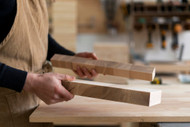LVL vs. Solid Wood in Construction: Which is Superior?
Posted by Daryl Schmidt on 13th Nov 2023
LVL vs. Solid Wood in Construction: Which is Superior?
When it comes to construction, the choice of materials plays a pivotal role in determining the success and longevity of a project. One of the perennial debates in the construction industry is the use of engineered wood vs traditional lumber. Each material has unique advantages and drawbacks, making it crucial for builders and architects to make an informed decision.
In this blog, we shed light on the key differences between LVL and conventional lumber. We look closely at the pros and cons of engineered lumber and solid wood and provide guidance on which material to choose for different construction applications.
Explore more about the features of Laminated Veneer Lumber (LVL) in this informative blog post on Canterbury Timbers, a trusted source for insights into the benefits and applications of LVL.
What is Laminated Veneer Lumber (LVL)?
Laminated Veneer Lumber (LVL) is a highly engineered wood product designed for strength and consistency. It is made by bonding thin wood veneers together with adhesive under heat and pressure. The result is a composite material that boasts impressive strength and stability.
LVL Timber Benefits:
1. Strength: LVL is known for its remarkable strength-to-weight ratio, making it ideal for load-bearing applications.
2. Consistency: LVL is free from knots, voids, and other imperfections found in solid wood, ensuring consistent quality.
3. Dimensional Stability: LVL is less prone to warping, twisting, or splitting, making it a reliable choice for structural components.
4. Length: LVL can be manufactured in long, continuous lengths, which is advantageous for large-span structures.
5. Sustainability: Many LVL products are produced using sustainably sourced wood, reducing the environmental impact.
The Strengths of Solid Wood
Solid wood, with its natural beauty and time-tested qualities, remains a classic choice in construction.
Advantages of Conventional Lumber Uses:
1. Aesthetics: The visual appeal of solid wood, with its natural grains and textures, is unparalleled. It's often used for exposed timber framing and interior finishes.
2. Structural Integrity: Solid wood is inherently strong and can support heavy loads, making it a reliable choice for certain structural elements.
3. Thermal Insulation: Solid wood provides excellent thermal insulation, helping regulate indoor temperatures.
4. Acoustic Properties: Solid wood has sound-absorbing properties, which can enhance the acoustic performance of a building.
5. Tradition and Craftsmanship: Solid wood is deeply rooted in the history of construction and carries a sense of craftsmanship and tradition.
LVL vs. Solid Wood: Key Differences
If you’re doing a comparison of LVL vs conventional lumber, then each material must be evaluated on the following aspects.
Strength and Durability:
Engineered wood productssuch as LVL excel in strength and durability, while solid wood retains its strength naturally.
Cost:
LVL is often more cost-effective for long spans and load-bearing applications, while solid wood can be pricier, especially for high-quality hardwoods.
Environmental Considerations:
LVL can be environmentally friendly if sourced from sustainable forests and produced using responsible practices. Solid wood's sustainability depends on responsible logging and forest management.
Ease of Installation:
LVL is known for ease of handling and installation, while solid wood may require more skilled craftsmanship for complex joinery.
Applications in Construction
LVL:
● LVL construction applicationsinclude beams and headers, especially in commercial buildings and modern residential construction.
● It's used in the assembly offloor and roof systems.
● LVL is a popular choice for engineered wood I-joists, commonly used in residential construction.
Solid Wood:
● Solid wood is often used in traditional timber frame construction for its aesthetic appeal.
● It's ideal for exposed structural elements in commercial spaces, giving a rustic and timeless look.
● Solid wood is popular for interior finishes, including flooring, cabinetry, and panelling.
Cost Analysis
The cost of LVL versus solid wood varies depending on several factors, including location, project size, and specific material choices.
Generally, LVL tends to be more cost-effective for load-bearing applications and long spans due to LVL strength and durability. Solid wood, on the other hand, maybe pricier, especially when using high-quality hardwoods or for projects that require specialised craftsmanship.
To get an accurate cost estimate, it's essential to consider the unique requirements of your project and obtain quotes from local suppliers.
Maintenance and Longevity
LVL in building materials generally requires less maintenance due to its resistance to warping, twisting, and splitting. On the other hand, solid wood may require more attention due to the traditional lumber characteristics, especially in exterior applications, to prevent decay, insect infestations, and weather-related damage.
In terms of longevity, both LVL and solid wood can have a long service life. Still, the specific durability depends on the environmental conditions, maintenance practices, and the quality of the material used. Proper care and regular inspections are essential for ensuring the longevity of structures built with either material.
Conclusion: Which is Superior for Your Project?
In the debate between LVL and solid wood, there isn't a universally perfect solution. The choice ultimately depends on your project's specific needs and priorities.
While the benefits of LVL in construction are plenty, solid wood is also a valuable material that shouldn’t be disregarded. Ultimately, the superior material for your construction project will depend on your unique requirements.
If you have been looking for high-quality engineered lumber for construction purposes in Sydney and beyond, then contact us today. Our range of timber products caters to diverse needs,
ensuring that you have access to top-notch Sydney wide building materials that meet the standards of excellence in construction.

